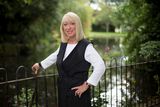‘I’m quite good at dossing,’ Anne Doyle tells the two bright Marys in their nice, gentle podcast
Review of Changing Times: The Allenwood Conversations, hosted by Mary McAleese and Mary Kennedy


Of course it should really be called The Two Marys. Because it is a podcast presented by Mary McAleese and Mary Kennedy, both heroines in their own lifetimes, to a very particular audience. McAleese was our president and then remade herself as a vocal critic of the Catholic church and of its misogyny and homophobia. She’s working from the inside. So, she’s busy.
Kennedy is already a national treasure, having been a television presenter for many years – until she was, as she says herself, forcibly retired.
Many people would sympathise with her on the forcibly retired part; less sympathy in this quarter for those interminable radio advertisements for Wiltshire Farm Foods. Hey, nobody’s perfect, but Kennedy kind of is.
Anyway, the podcast is called Changing Times: The Allenwood Conversations. Allenwood is in Co Kildare, apparently. The podcast is proudly supported by Kildare County Council.
And the two Marys told VIP Magazine that they were pleased that the podcast is recorded outside Dublin. They are very much in favour of rural Ireland.
The podcast is pleasant, and nicely done. Why it is called Changing Times is a mystery because in the three episodes under review, there wasn’t much talk of change – of any kind – and one interviewee, Stefanie Preissner, said that she actively dislikes it.
Preissner is the interviewee in the latest, sixth episode. The two Marys were wise enough to let her run, in a fine example of light-touch interviewing. The result was an extraordinarily intimate and personal 50 minutes, dealing with both autism and multiple miscarriages. Quite amazing and almost seamless.
There was a moment when McAleese joked that when she went up to heaven, Preissner might discover that God is autistic. Although, personally, I have had my suspicions on exactly that for years, this suggestion did not get much of a reaction from Preissner – and who can blame her?
Similarly, when talking to Damian Browne about his 112 days rowing from New York to Galway and wondering how he had endured a storm, she joked: “ You weren’t saying the rosary then?”
To which the answer was simply “ No.”
Although Browne’s parents are called Mary and Joseph, which is interesting. And so is the fact that he does not know how to swim.
Read more
McAleese had a tough time with her spirituality questions. Browne effectively said that the word spirituality meant nothing to him. “I struggle with that word,” he said.
Preissner said: “I believe in electricity.” It wasn’t exactly a rich seam.
However, the interviewers have a steady confidence about them, a sort of ease, and the atmosphere is relaxed. The two Marys might be at their best not at discussing their interviewees’ lives, but at talking with them about the state of the world. “I was born just after the Second World War,” McAleese told Preissner, before going on to say that the previous decades had been “just chaos”. Her point was that the world isn’t necessarily going to hell in a handcart at the moment, that things have often been this bad and indeed worse.
There is a sort of summary at the end, where the two Marys discuss the interviewee after, presumably, the interviewee has left. This doesn’t work well in the three episodes I listened to. And nor does asking the interviewees what single thing they would do to change the world. “That’s a bit of a poser, isn’t it?” said Anne Doyle. Perhaps guests should be given more warning on this one.
Anne Doyle told the two Marys that she was 'definitely' suspended from RTÉ twice. Photo: Mark Condren
What worked really well was their interview with Doyle. If Preissner believes in electricity, then Doyle’s family house in Co Wexford did not get electricity until she was nine years of age. It sounded like a perfect childhood. The interview covered everything from Doyle’s involvement in RTÉ politics decades ago – she was ‘definitely’ suspended from RTÉ twice, she says – to the deaths of her mother, father, sister and brother. And her despair during the hunger strikes in the 1980s: “It just seemed so hopeless.”
Again, the two Marys let her talk, with just the occasional guiding touch.
They are not above opening the podcast by commenting on there being a long stretch in the evenings; it is the guests who have to bring the rigour. Kennedy says that Doyle took early retirement. “Now Mary, it wasn’t that early,” says Doyle pleasantly. She’s not one for being super active in retirement either – unlike, one imagines, the two Marys; “I’m quite good at dossing.” She says she was cured of all domestic activity when she was called home from boarding school to replace her mother at the heart of a busy household; her mother had fallen whilst wallpapering.
So this is a nice, gentle podcast with two bright women who know what they’re doing. It is still not clear where change comes into it, and some of us will never be clear about where or what Allenwood is. It is intelligent comfort listening and it will have many fans.
Join the Irish Independent WhatsApp channel
Stay up to date with all the latest news

















